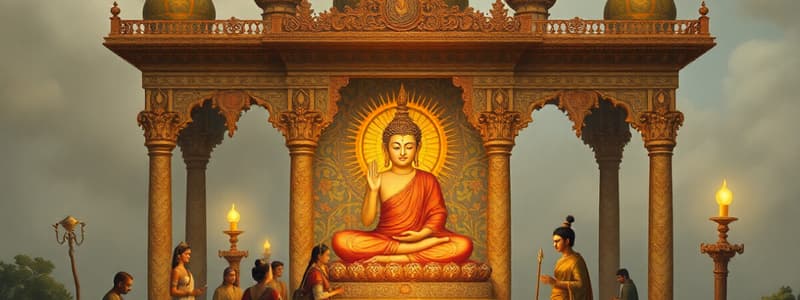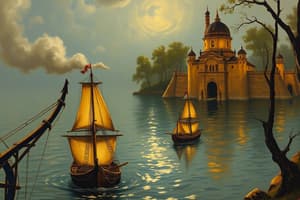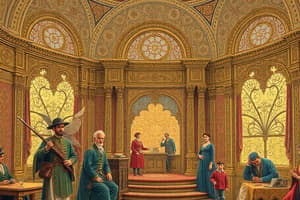Podcast
Questions and Answers
In what year did Alexander invade India?
In what year did Alexander invade India?
- 340 BC
- 323 BC
- 326-325 BC (correct)
- 331 BC
What significant event occurred in 561 BC?
What significant event occurred in 561 BC?
- Establishment of the Slave Dynasty
- Nirvana of Mahavira
- Death of Mahavira
- Birth of Gautam Buddha (correct)
Which event marks the beginning of the Hijri Samvat?
Which event marks the beginning of the Hijri Samvat?
- 630 AD
- 622 AD (correct)
- 580 AD
- 600 AD
Who visited India in 630 AD?
Who visited India in 630 AD?
When did the First Battle of Panipat take place?
When did the First Battle of Panipat take place?
What year did the Dandi March Salt Satyagraha occur?
What year did the Dandi March Salt Satyagraha occur?
Which event is associated with 1905 AD?
Which event is associated with 1905 AD?
What significant event took place in 1914-1918 AD?
What significant event took place in 1914-1918 AD?
What year did the Assassination of Mahatma Gandhi occur?
What year did the Assassination of Mahatma Gandhi occur?
What battle was fought in 1761 AD?
What battle was fought in 1761 AD?
Flashcards are hidden until you start studying
Study Notes
Major Events in Indian History
- Arrival of Aryans: 1500 BC
- Birth of Mahavira: 540 BC, Founder of Jainism
- Nirvana of Mahavira: 468 BC, Attained enlightenment and passed away
- Birth of Gautam Buddha: 563 BC, Founder of Buddhism
- Mahapravarthana of Gautam Buddha: 483 BC, Buddha's enlightenment and teachings spread
- Alexander's Invasion of India: 326-325 BC, Greek King Alexander the Great invaded northwest India
- Conquest of Kalinga by Ashoka: 261 BC, Ashoka's empire expanded after a bloody war, leading to conversion to Buddhism
- Beginning of Vikram Samvat: 58 BC, Calendar system in use in parts of India
- Beginning of Shak Samvat: 78 BC, Calendar system used today in Pakistan, Bangladesh, and parts of India
- Beginning of Hijri Samvat: 622 AD, Lunar calendar used by Muslims
- Fahyan's visit to India: 405-411 AD, Chinese Buddhist monk who traveled to India to study Buddhist texts
- Harshvardhan's Rule: 606-647 AD, Emperor who ruled North India, known for his patronage of art and learning
- Hieun Tsang's visit to India: 630 AD, Another Chinese Buddhist monk who traveled to India for scriptures
- Attack on Somnath Temple: 1025 AD, Mahmud of Ghazni looted the Somnath temple in Gujarat
- First Battle of Tarain: 1191 AD, Battle between Mohammed of Ghor and Prithviraj Chauhan, ending in a stalemate
- Second Battle of Tarain: 1192 AD, Mohammed of Ghor defeats Prithviraj Chauhan, leading to the expansion of the Delhi Sultanate
- Establishment of Slave Dynasty: 1206 AD, Founded by Qutub-ud-din Aibak, the first dynasty to rule Delhi
- Vasco da Gama's arrival in India: 1498 AD, Portuguese explorer reaches India, opening trade routes and leading to colonization
- First Battle of Panipat: 1526 AD, Babur defeats Ibrahim Lodi of the Lodi Dynasty, establishing the Mughal Empire
- Second Battle of Panipat: 1556 AD, Akbar defeats Hemu, securing the Mughal Empire
- Third Battle of Panipat: 1761 AD, Marathas are defeated by Ahmad Shah Durrani, weakening the Maratha Empire
- Akbar's Accession: 1556 AD, Becomes Mughal Emperor, known for religious tolerance and administrative reforms
- Battle of Haldighati: 1576 AD, Akbar defeats Rana Pratap of Mewar, but Rana Pratap continues to fight
- Establishment of Deen-e-Ilahi religion: 1582 AD, A syncretic religion by Akbar, combining elements of Hinduism, Islam, and other beliefs
- Battle of Plassey: 1757 AD, British East India Company defeats Siraj-ud-Daulah, marking the beginning of British rule
- Battle of Buxar: 1764 AD, British East India Company defeats Mir Qasim, strengthening their control
- Permanent Settlement in Bengal: 1793 AD, Land settlement system by Lord Cornwallis, landlords gained ownership of land
- First Partition of Bengal: 1905 AD, Bengal was divided to weaken nationalist movements, protests followed
- Establishment of Muslim League: 1906 AD, Political party representing the interests of Muslims in India
- Morley-Minto Reforms: 1909 AD, Granting limited voting rights to Indians, increased Indian representation in legislatures
- First World War: 1914- 1918 AD, India participated as part of the British Empire
- Second World War: 1939-1945 AD, India participated again for the British Empire, further fueling the independence movement
- Non-cooperation Movement: 1920-1922 AD, Led by Mahatma Gandhi to protest against the Rowlatt Act
- Arrival of Simon Commission: 1928 AD, An all-white British commission to review constitutional reform, met with protests
- Dandi March Salt Satyagraha: 1930 AD, Gandhi's non-violent protest against the British salt tax
- Gandhi Irwin Pact: 1931 AD, Agreement between Gandhi and Viceroy Irwin, leading to the release of political prisoners
- Arrival of Cabinet Mission: 1946 AD, British mission planning India's independence, leading to the partition
- Assassination of Mahatma Gandhi: 1948 AD, Assassinated by Nathuram Godse supporting a Hindu Rashtra
- China's attack on India: 1962 AD, Border conflict between India and China, leading to a Chinese victory
- India-Pak War: 1965 AD, War between India and Pakistan over the Kashmir region
- Tashkent Agreement: 1966 AD, Peace treaty signed between India and Pakistan to end the 1965 War
- Talikota War: 1565 AD, Deccan Sultanates defeat the Vijayanagara Empire, marking the end of the Hindu kingdom
- First Anglo-Mysore War: 1776-1769 AD, British East India Company vs. Mysore kingdom, resulting in a stalemate
- Second Anglo-Mysore War: 1780-1784 AD, Mysore kingdom defeats the British, showing their military strength
- Third Anglo-Mysore War: 1790-1792 AD, British defeats Mysore, but Tipu Sultan of Mysore continues to fight
- Fourth Anglo-Mysore War: 1799 AD, Tipu Sultan of Mysore is defeated and killed by British forces
- Kargil War: 1999 AD, Border conflict between India and Pakistan in Kargil, resulting in an Indian victory
- First Round Table Conference: 1930 AD, Discussions on India's constitutional reform, but no agreement reached
- Second Round Table Conference: 1931 AD, Gandhi attends, but tensions remain between Indians and the British
- Third Round Table Conference: 1932 AD, Deals with India's political and social reforms, but no agreement reached
- Arrival of Cripps Mission: 1942 AD, British plan for limited self-government, rejected by the Indian National Congress
- Chinese Revolution: 1911 AD, Overthrew the Qing Dynasty, establishing the Republic of China
- French Revolution: 1789 AD, Overthrew the French monarchy, leading to a republic and major social changes
- Russian Revolution: 1917 AD, Bolshevik Revolution, overthrowing the Tsarist regime, and leading to the establishment of the Soviet Union
Other Important Events
- The Indus Valley Civilization: 3300-1300 BCE, Flourished in the Indus River Valley, with advanced urban planning and a sophisticated system of writing, left significant archaeological sites
- The Mauryan Empire: 322-185 BCE, Unifying large parts of India under Chandragupta Maurya, with Ashoka implementing a policy of non-violence and Buddhist principles
- The Gupta Empire: 320-550 CE, Era of great advancements in art, literature, and science, known as the "Golden Age" of India
- The Delhi Sultanate: 1206-1526 AD, Period of Muslim rule in Delhi, with various dynasties influencing Indian culture and politics
- The Maratha Empire: 1674-1818 AD, Powerful Hindu empire in Western India, challenged the Mughals and played a significant role in resisting British expansion
- The British Raj: 1757-1947 AD, Period of British rule in India, with significant economic, social, and political impact
Studying That Suits You
Use AI to generate personalized quizzes and flashcards to suit your learning preferences.




